The 60th OGA Annual Race was held at Stone Sailing Club on 27 July, 2024. This race report has been written by James Boyd, ‘Concord of Mersea’ illustrated with photos from Seamus Masters and Sandy Miller.
The day dawned clear and with little wind as I clambered out of Concord’s cabin, cast off her mooring at Clamp House and motored up the misty Ipswich river. I locked into the dock and was pottering down below when the thump of a seabag on the deck heralded the arrival of Timbo Plummer. ‘Right mate! I’ve brought tea and sugar and milk and … a proper sized mug’ he declared, drawing out of his bag an object that resembled a bucket with a handle. ‘Is the kettle on?’ The kettle was and, having kept his tea based life form happy, we proceeded to refuel and water the ship as quickly as we could and let go to catch the last of the ebb to Harwich. The Old Gaffers Annual Race at Stone was on the morrow and we were keen to catch the young flood through the Wallet.
Late on the tide we headed out to sea with a fair forecast and all the signs of an uneventful passage but as we fetched Stone Banks buoy the wind increased and drew forward. The sea began to show sharp little teeth. ‘Concord’ kicked up her heels and pitched into the rising chop. We found ourselves donning oilies and bearing away for the Gunfleet as we looked warily to windward. It turned out to be nothing but the faintest reminder of what the mate called a ‘wallet bastard’ and soon the sea smoothed and we wished for a capful of wind as we wallowed towards the Blackwater. Oilies were returned to their locker and other garments joined them as the temperature soared. ‘Concord’ seemed to realise she was returning to home waters. There was a faint disturbance felt through the helm. Her early life was spent in West Mersea where she had been the muse of artist Archie White. He immortalised those pre-war years with exquisitely painted track charts and tomes of their adventures; a record of skylarks and ebullient spirits before the world darkened and the tides of war passed beneath her keel. On the horizon the mirages and inversions of the Thames Estuary turned the day into a surreal dream and as the sea became glass it was as if we were floating back into those watercolour pages of the 1930’s.
As we approached the entrance to the Blackwater other gaff sails began to slide over the horizon on a track to the Stone Yacht Club. Beautiful ‘Gladys’ wended upriver ahead of us. ‘Fable’ nuzzled a buoy outside the club and we admired, as always, her perfection of lines. Supper was steaming away on the Taylor’s stove and the kettle was whistling the promise of yet more tea as we finally picked up a mooring for the night. The club had laid on water taxis and it was a pleasure to avail ourselves of their good humoured services without engaging in the onerous job of pumping up the rubber duck. Ashore we soon found ourselves in a cosy fug of bonhomie and banter fuelled by real ale and the reunion of old friends. Tankards in hand we gazed out over the little ships at rest as the sun settled into the marshes and the sky caught fire. At nightfall ‘Maria’ stole into the river, silhouetted and dangerous; a flypast of engineless sailing from the virtuoso duo of Paul Winter and Tom Curtis. One could hear the smack of a gauntlet being laid as she sidled into her anchorage under scandalised main.
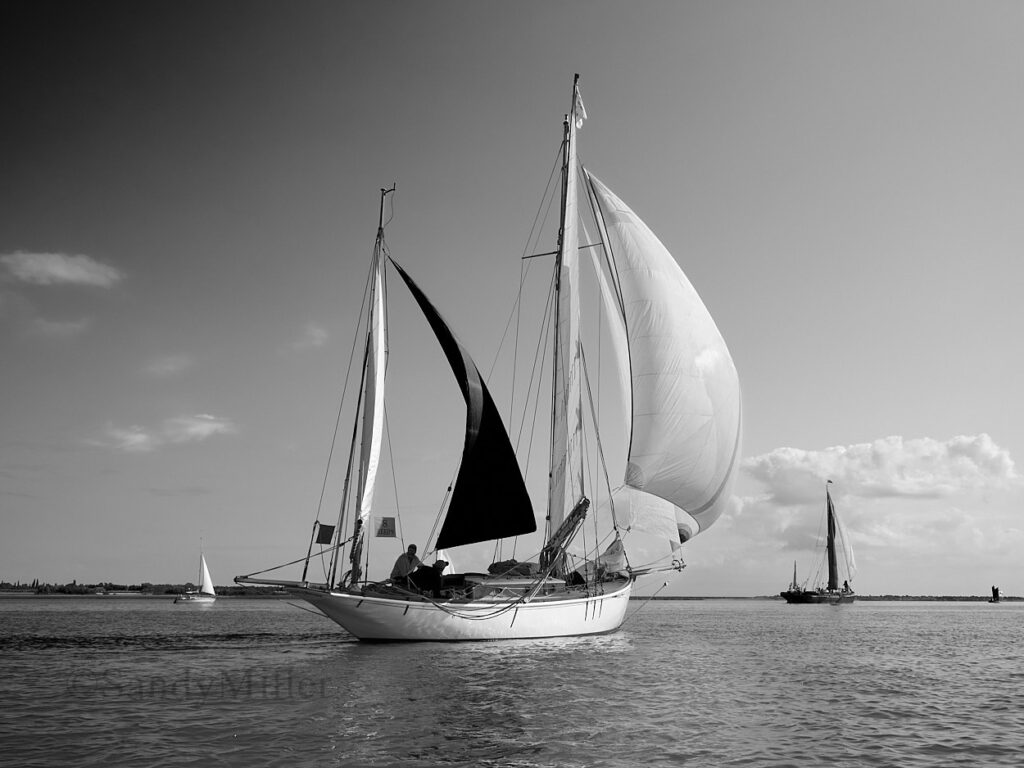
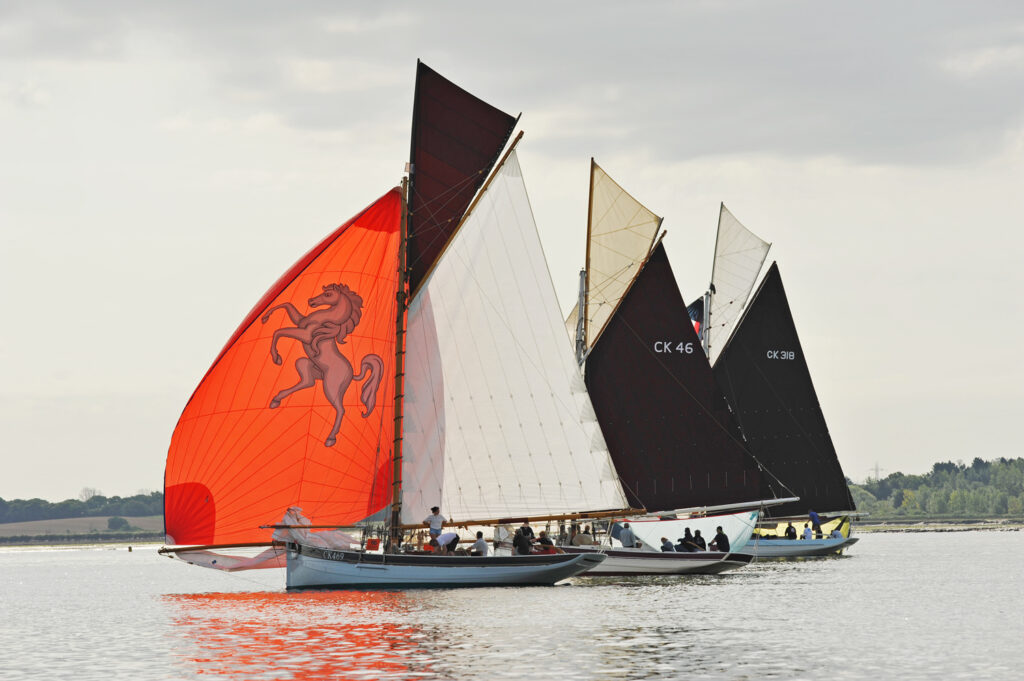

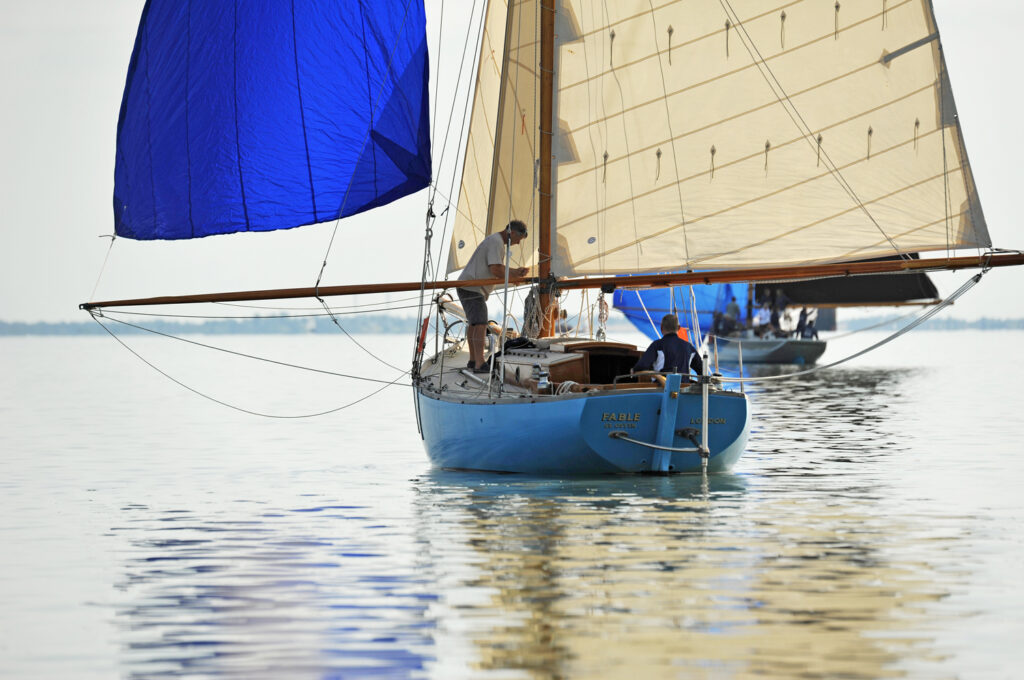
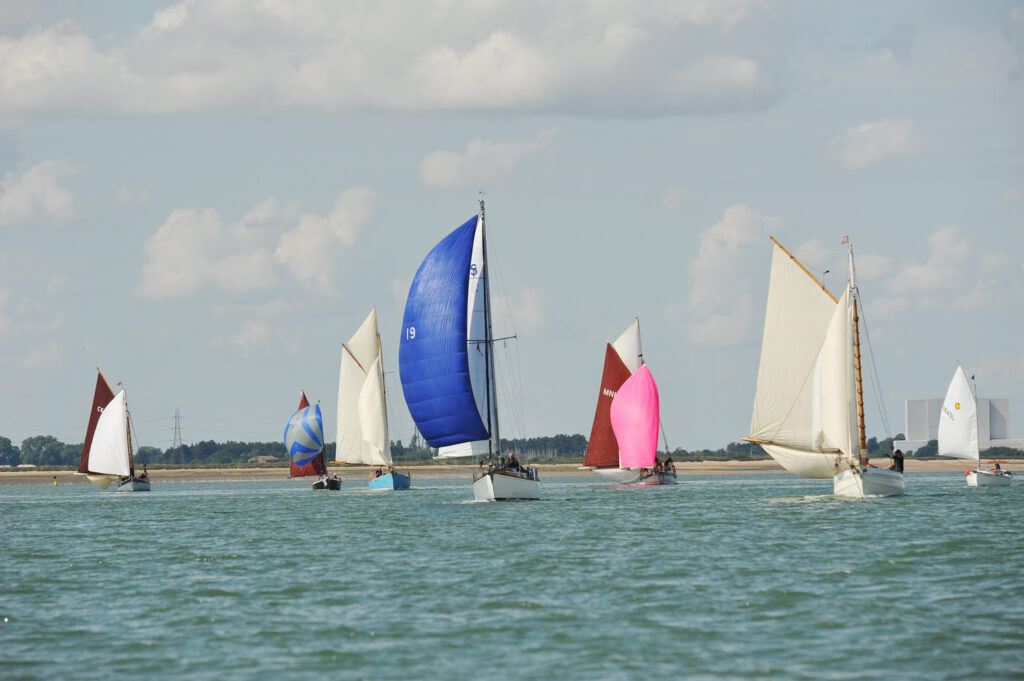
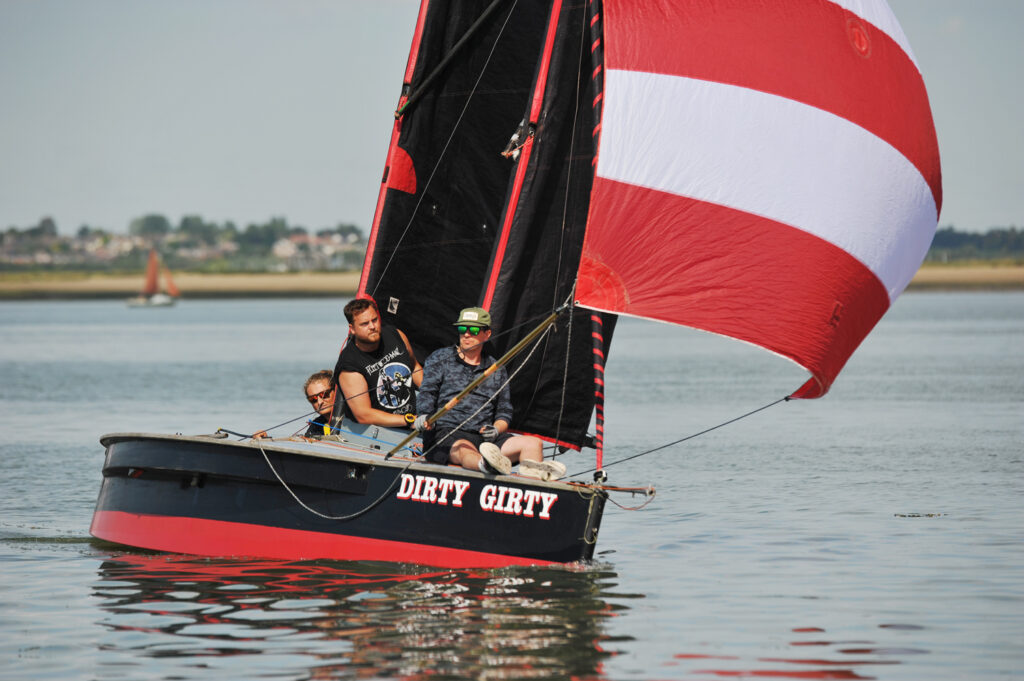
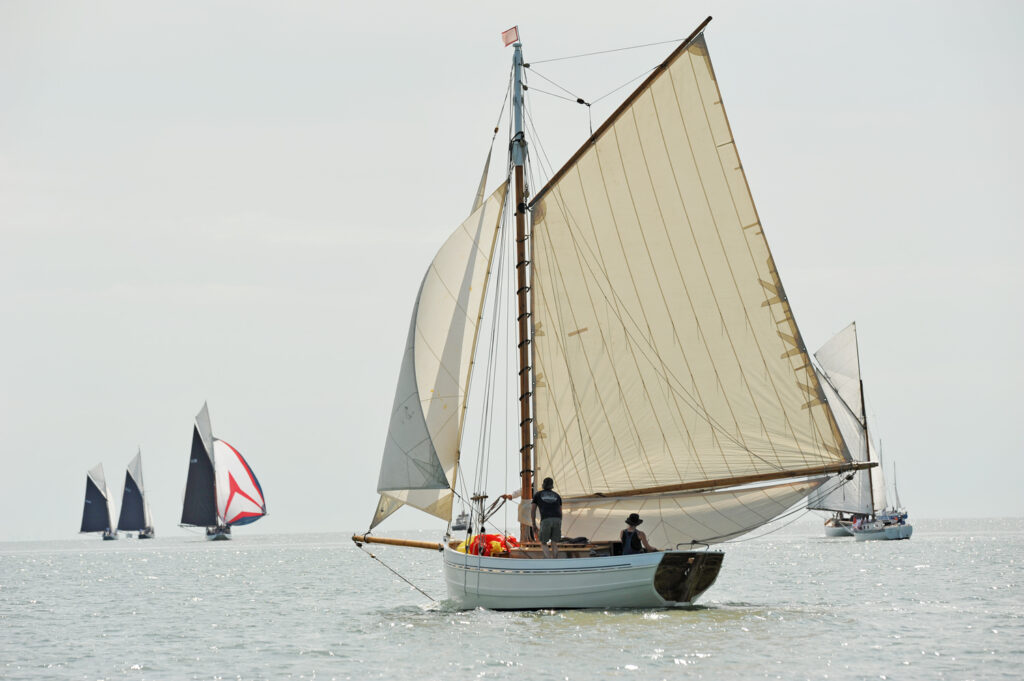

We awoke the next day in time to see a pert smack with a crew of young bloods drop her anchor almost on the start line. ‘Dirty Girty’ was ferrying crew from boat to boat. Exclamations of mirth and occasional good natured imprecations floated across the water. The clank of a windlass began marking time. And suddenly like a hatch of mayfly the river was full of boats. We let go the mooring and headed into the fray. ‘Concord’ was not designed for light weather; she likes the wind and was built to make long passages to far away places. Her sails for such circumstances had never been out of the bag and we were unclear if they would fit. The night before we had hauled the ghoster up on deck and found its corners but it remained to be seen what would happen when it was hauled to the mast head. Imagine our glee when, after saying a close hello to ‘Fanny of Cowes’ bowsprit, we found ourselves within a cats whisker of the first boat over the line and with everything setting in fine full curves. The ghoster ghosted and the mizzen staysail pulled her along beautifully. Tea simmered on the stove and all was right with the world.
And then the pert little smack of that morning popped out a cloud burst of colour from the end of her sprit and sailed merrily past us. Indeed we suddenly found ourselves in the thick of a veritable array of bow chasers of varying hues. Water sails appeared beneath booms. ‘Martha’ was showing a turn of speed that would prove to be fatal to the rest of the fleet. And slowly at first but with gathering pace we were passed. We weren’t worried or surprised. There is, after all, a whiff of black magic about the Essex Smacks; they have the miraculous speed of an open 60 and the crews I am sure dance by the light of the moon, chew broken bottles, and make spells before each race. It was when the pocket gaffers began to show us their sterns that we realised our true predicament. The wind was teasing the fleet. Catspaws appeared and disappeared and a patch of dark water offered hope only to collapse into an oily wind-hole of slatting sails. Far astern the last boat suddenly heeled to a fine breeze and we waited for the same wind to reach ‘Concord’ whereupon we would most surely catch up with the fleet ahead. But it was not to be. ‘Rely’ (for it was she) roared past us in a cumulus of sails and when the breeze touched us she was already romping downwind and becoming smaller by the minute.
The mate and I slumped a little as we found ourselves at last at the back of the fleet. ‘Maybe it’s just not ‘er day’ said Timbo ‘Tell yer what though, I ain’t used to being back o’ the fleet in the Blackwater, it’s a new experience’. The tide grew a little older and so did we as we watched the fleet draw away to the horizon, rounding the hay seed of the Bench Head Buoy. As they hardened up and sailed back past us we found ourselves alone save for a fishing boat at anchor. ‘Concord’ was uneasy in the confluence of waters. The tidal gate shut inexorably and we observed with interest that we were now sailing backwards as the flood started to run. There we lay, a painted ship on a painted ocean and I remembered suddenly that Archie White had painted many pictures of ‘Concord’ with the Bench Head abeam, outward bound or coming home. It was a mark of significance for them both. The tide swirled and my neck prickled. I remembered a time on passage round the outside of the Isle of Wight when I had appeared to see the face of her old skipper smiling owlishly at me through the companionway in the night watches. I became convinced that his shade was out there at the buoy calling for his old love to stay forever. I was brought back to earth by an outraged cry from the mate who had discovered his tea mug was in need of replenishing. The wind filled a little and we began to make slow progress. The rest of the fleet had re-entered the river by the time we were able to harden up and with a freshening breeze, ‘Concord’ buried her shoulder and began to show some interest.
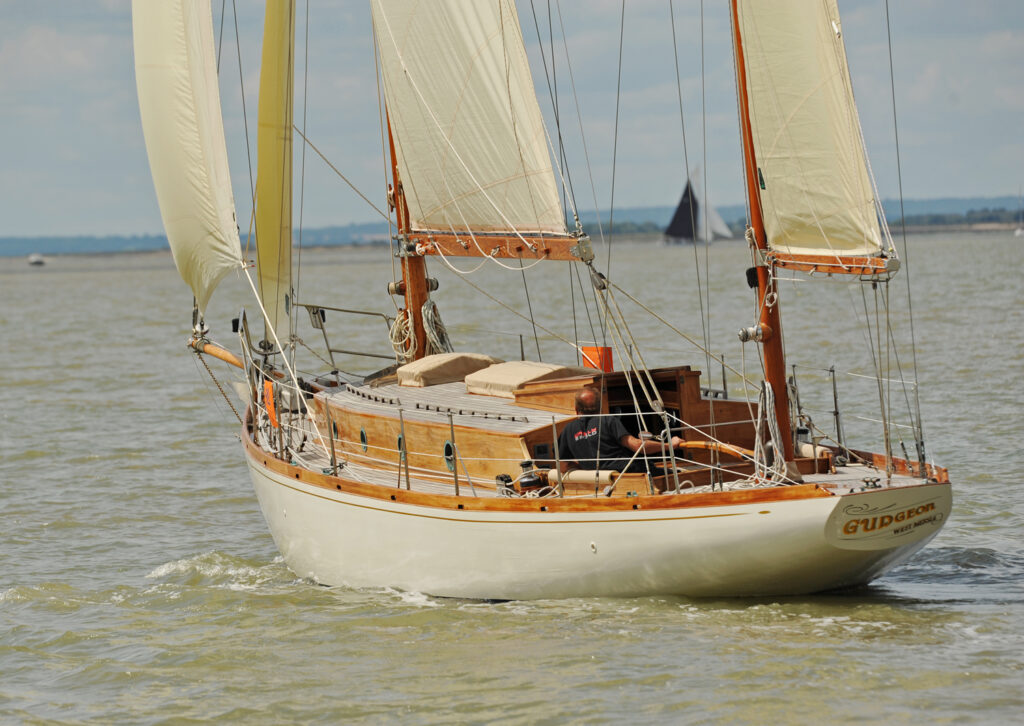



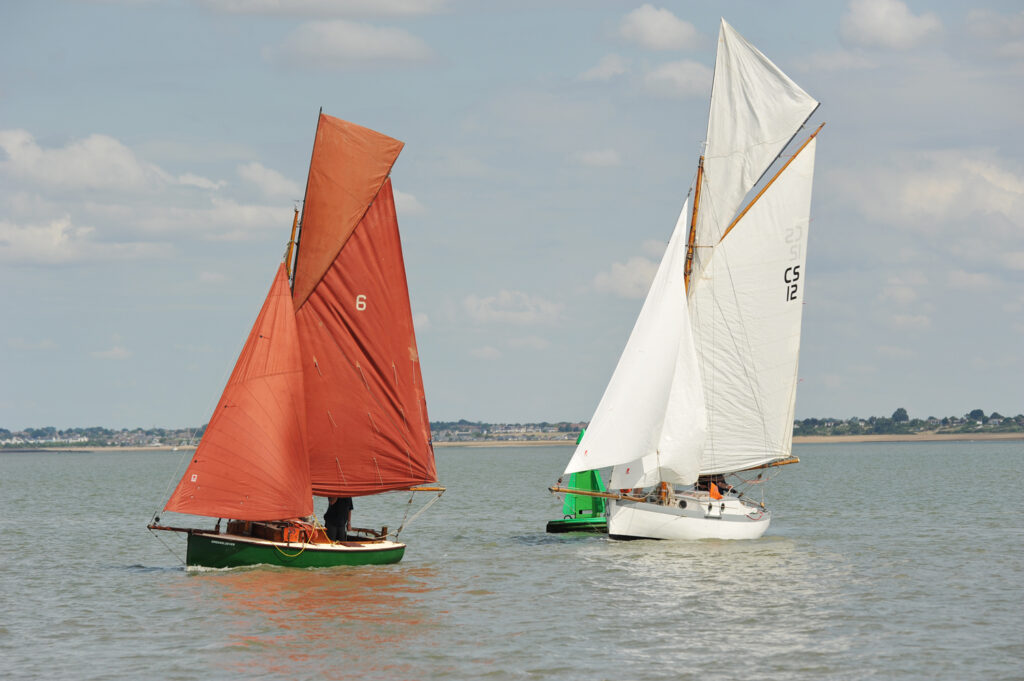
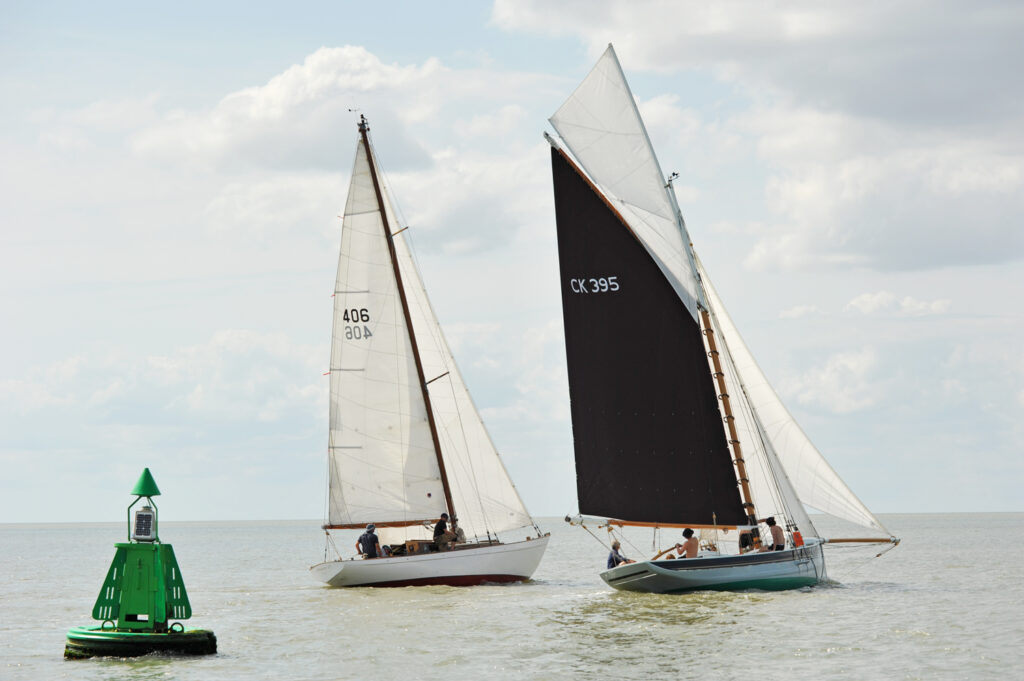


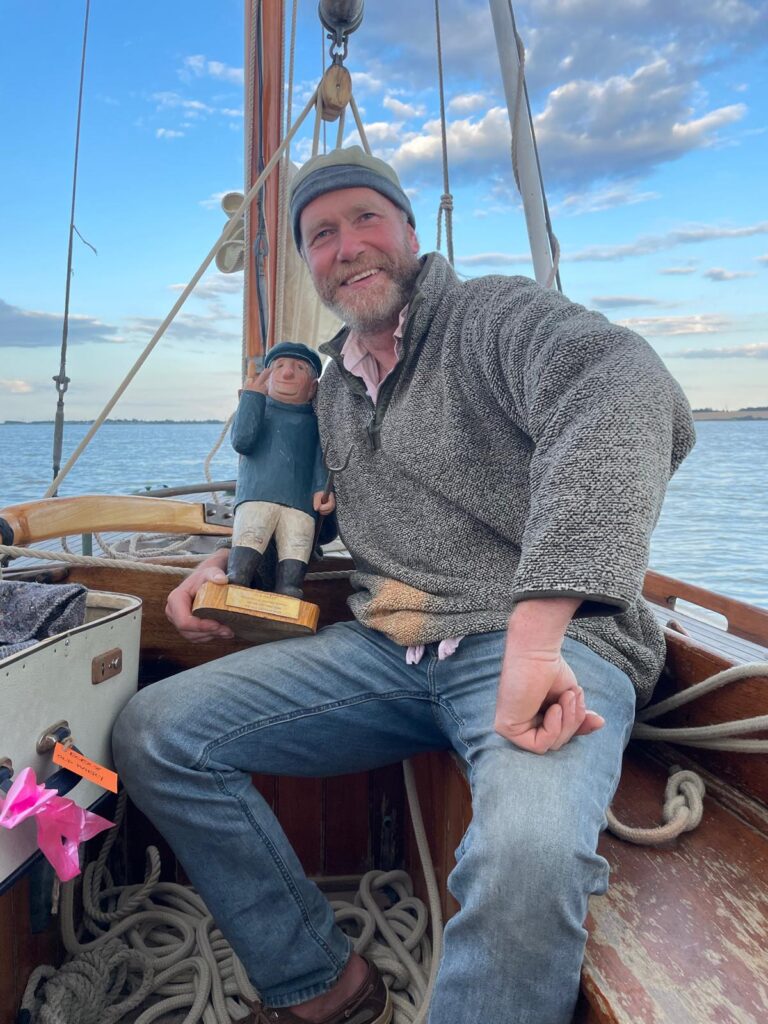
It occurred to me at this point to hang over the weather rail and have a good look at her bottom. To my chagrin there wasn’t much paint showing beneath a carpet of mud scale. I hung on by my toes and swiped a half circle under her water line with my arm. It emerged looking like an artefact from the seabed. As I raised the offending object above my head the mate let out a howl of derision. ’You ‘avent scrubbed! And you’re going to get the Old ‘Arry prize! And it serves you right for sailing to France last week instead of workin’ on ‘er!’. Slightly nettled by this lack of loyalty I stuck two muddy fingers up at him and we spent the next few tacks exchanging pleasantries that eventually became laughter. There was after all some relief in the banishing of uncertainty and it is a fact too that ‘Concord’ likes more of a breeze and even with the silkiest of undersides may have found herself, though perhaps not quite so dramatically, last. As we fetched back into the river with what was now a fine wind we swallowed our pride with rueful grins and hot tea. Showing her best side and hiding all evidence of the skipper’s laxness ‘Concord’ surged over the finish line.
It had been a wonderful time amidst the loveliest of East Coast boats. The sun went down, glasses were raised on the Stone Yacht Club terrace and the evening lull settled on the water as night drew its veil over the memories of the day. ‘Old Harry’ now sits on the shelves in the kitchen at home, his two fingers raised and his gaff jaws at the ready. I feel a strong connection with all East Coast sailors as he eyes me over the morning brew.
Words & ‘Old Harry’ photo, copyright: James Boyd 9 August, 2024
Photos: Sandy Miller & Seamus Masters

You must be logged in to post a comment.